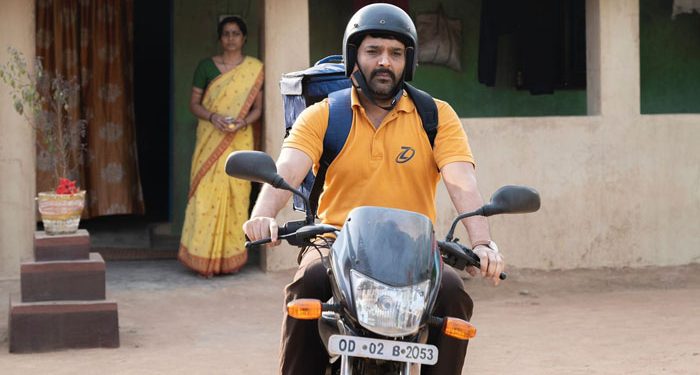Bhubaneswar is famous for its temples. To introduce the audience to its environment, any film set in this City, usually, begins with a montage of temple shots. But Zwigato, Nandita Das’s latest, a film shot entirely in Bhubaneswar, starts with a dream sequence, on a train, which is a metaphor for its main character’s life.
Manas (Kapil Sharma) is a former factory manager from Jharkhand who is now living in Bhubaneswar with his wife, sick mother, and two kids. He works as a delivery worker, through an application the film is named after: Zwigato. When Das does show us Bhubaneswar, she does it through the eyes of Manas, and his wife Pratima (Shahana Goswami), who traverse the City in search of work. So, we get to see the elegant temples, only when Manas has to deliver an order inside one of them.
Though Das successfully uses some of the opportunities to generate conflict, the experience of watching the film can be compared to reading five well-researched articles on how executives use words like freedom and self-employment to sell labour exploitation in the new gig economy
And Das brings to the screen how labour moves in this modern metropolis, how the working class lives; how the daily wage labourers fight for work in auto stands every morning, and how there are levels to economic inequality. Though the Bhubaneswar of Zwigato is nowhere close to the Mumbai of CityLights’s (2014), which is brutal and absolutely merciless to a migrant couple, this City has its share of discriminations and dirty tricks, visible in its separate elevators for ‘service people’ in gated communities and outside waiting counters for delivery workers in posh restaurants.
But central to the film are the struggles of Manas, of delivery workers: the drive for incentives and good ratings; the race to complete the maximum number of orders in time; dealing with an algorithm, a system, that’s heartless. There are plenty of opportunities for drama in all this uncertainty and imbalance.
Though Das successfully uses some of them to generate conflict, the film overall feels flat, failing to evoke any strong emotions. The experience of watching it can be compared to reading five well-researched articles on how executives use words like freedom and self-employment to sell labour exploitation in the gig economy.
Despite this, Zwigato will go down in film history for documenting labour struggles of this century and more importantly for revealing the layers of inequalities that define a city like Bhubaneswar. Furthermore, it will stay in people’s memory for performances of its cast, Sharma and Goswami in particular, who are neither subtle not over-the-top.
Originally published in OrissaPost March 20, 2023






































